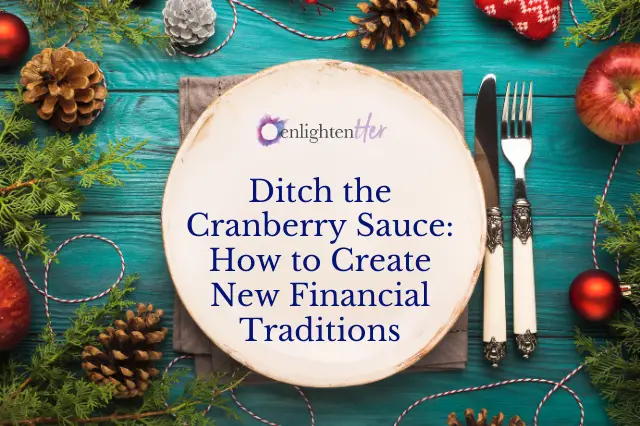What are you making for Christmas dinner? A perfectly baked ham, your grandmother’s famous stuffing, or maybe a delicious Christmas pudding?
Regardless of your answer, I want you to think about why. Why are you making that particular dish?
For most of us, the answer is, “because that’s what we always do, it’s a family tradition.”
If you grew up having prime rib with all the fixings for Christmas dinner, then you’re likely to serve the same prime rib dinner to your children. No one told you to make the same dinner. No one had to. It’s tradition. It’s just “what we do.”
This is a great example of an invisible script (see eH blog What is a Money Script and Why Does it Matter?) that’s been passed down, from generation to generation, without nary a word spoken.
“That’s just what we do.”
That’s just how it goes. We follow our traditions instinctively, unquestionably.
“What? Are you serious? Get an artificial tree?? Are you NUTS!!?? We HAVE to have a fresh tree and we have to cut it down ourselves. You need help.”
The same goes for traditions around Thanksgiving, Easter, even birthdays. Now, this isn’t inherently a bad thing. Some of our fondest memories come from family traditions even if we don’t know why we partake in them or where they came from. For most of our traditions, “what we do” is answer enough. But, can we say the same for financial traditions?
What are financial traditions?
Just as we inherit holiday traditions, we also inherit financial traditions. Like our Christmas traditions, we don’t always know why we hold these financial ideas or behaviors, we just do. For many of us, our current money beliefs have been passed down from our parents and adopted without question. We’ve inherited financial beliefs like:
“Renting is a waste of money; buy a home as soon as possible.”
“Always pay cash; never finance anything.”
“Student loan debt is a good investment; it always pays for itself.”
These seem like sound financial principles. And they are. Generally, speaking that is.
None of the statements above are inherently right or wrong. Renting can be a waste of money. Having no debt is usually a great idea. College is often an excellent investment. It’s easy to follow traditions like these because you only need to be “cocktail napkin” smart for these ideas to make sense.
But, there are many situations where adhering to these beliefs doesn’t work.
Let’s go through each examples one by one:
- Renting is often a far better financial decision than buying. If you only have the bare minimum for a down payment, have no cash reserve, expect to move in a few years, or have just gotten divorced, renting might be a far better decision than buying.
- “Never finance anything” makes every financial transaction only about the money and ignores what you’re getting for your money. Sometimes going into debt is the best way to get most out of life. Sure, you’ll pay more because of the interest, but you may gain something even more valuable than money – a special memory that will pay dividends for a lifetime.
- The sentiment that college always pays for itself is simply not true .The price you pay for school matters, and college isn’t always a wise investment especially if you choose a major with limited job prospects.Emerging from your college years with $90,000 in student loan debt and a degree in art history (or the like) is almost always a terrible financial decision.

There is nothing wrong with using financial traditions as a starting point. But, that’s all they should be: a starting point. What is solid financial advice for one person could be disastrous for another even within the same family.
The problem is we adopt financial traditions as completely as we adopt cranberry sauce at Thanksgiving.
Why did I buy a house a year out of college? Because “renting is a waste of money.”
Why didn’t I finance part of my honeymoon and extend our trip? Because I should “always pay cash.”
Why do I have $75,000 in student loan debt and a lower income career? Because “college always pays for itself.”
You may be thinking, “Is it really that simple? Do we really take these family money beliefs and turn them into financial traditions without much thought?”
Yeah, pretty much.
Studies have shown when participants were asked where their core financial beliefs came from, they often identified their parents as the primary source. This isn’t particularly surprising. What is surprising is just how little they questioned these beliefs. Turns out, just as we make prime rib on Christmas because that’s what our parents did, we adopt financial behaviors in very much the same way.
It’s no fluke children who come from parents of “savers” are often “savers” themselves. Children of “spenders” are often “spenders.” The key is to recognize how your upbringing affects your financial decision-making today and reassess if what you’re doing is in your best interest. It’s okay to grow up to be “just like your parents” by choice. It’s another thing to do so by default.
How to create financial traditions that work for you

Question your financial traditions
Question your financial beliefs. Where did they come from? Are they valid for where you are right now? What options have you NOT explored because of your beliefs?
It’s easy to go with the status quo and keep doing what you were doing. But, easy doesn’t make it right. Broaden your gaze and consider financial options that conflict with your current belief system. If you do the research and your current beliefs are validated, great. If there is a better way, great.
Either way, you’re making a fact-based decision and not going with the default. Critically think your way to the right decision.
Educate yourself
It’s easier to create new and constructive financial traditions when you understand how money works.
If you have a lack of financial knowledge, invest some time and energy into learning the fundamentals. There’s a wealth of knowledge available, much of it free. Whether it’s financial websites, blogs, podcasts, or books, start small and you’ll be surprised how quickly you can grow your financial knowledge and capabilities.
Know your “why” and your “how”
Behavior change is hard.
If you feel like you need to modify some of your financial traditions, it’s important you know your “why.” Why do you want to change your ideas or behaviors?
Your “why” answers the “is it worth it?” question. If you have a compelling “why,” there’s a greater chance you’ll stick with it and do the work required of you. It’ll be “worth it.”
Equally important is your “how.” How are you going to make the changes required? What is your plan?
The “how” provides the discipline and structure needed to make a lasting change.
Are you ready to make new financial traditions?
Holiday traditions, such as cutting down your own Christmas tree, are usually harmless and fun. But, financial traditions are different and can have serious financial consequences if applied inappropriately.
Christmas is the perfect time to reflect and contemplate the origin of your core money beliefs. It’s the perfect time to reassess them and see if they’re working for or against you.
If you’re doing it right, there should be alignment between your money beliefs and your life goals. If there isn’t, it’s time to reassess even your staunchest financial beliefs. Not only do you want to get this right for you, but for future generations. After all, how you handle your money now becomes your kids’ or grandkids’ version of “that’s just what we do.”


